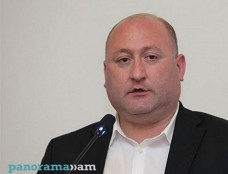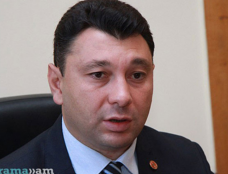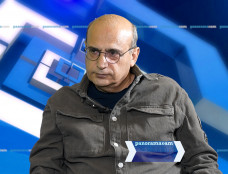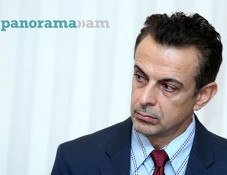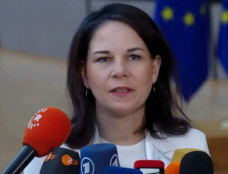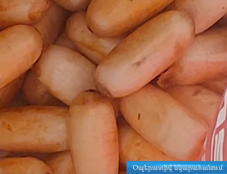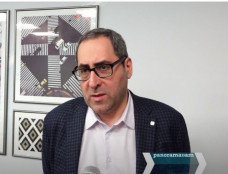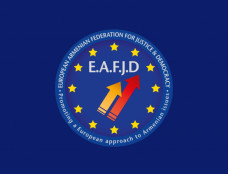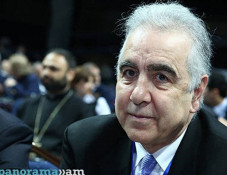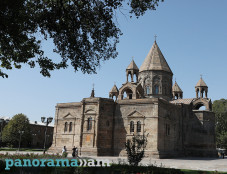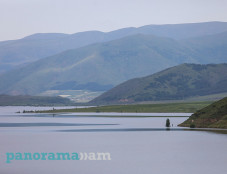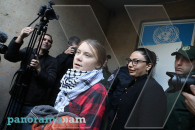
Serzh Sargsyan: Armenia is committed to development of cooperation with EU
Armenian President Serzh Sargsyan on Tuesday made remarks at the opening ceremony of the Fourth Ordinary Session of the Euronest Parliamentary Assembly (PA). The text of the President’s address is provided below.
Distinguished Chairman of the National Assembly,
Distinguished Co-Chairs of the Assembly,
Distinguished members of the EURONEST Parliamentary Assembly,
It is a pleasure to greet you in Yerevan on the occasion of your participation in the Fourth Ordinary Session of the EURONEST Parliamentary Assembly.
This week can be considered to be a truly “European” one for us: we are glad to host the EURONEST Session in Yerevan, after which I will depart for Brussels to participate in the EPP Summit. Both in Yerevan and Brussels I am scheduled to meet with the high level EU officials, and a few days later the Session of the Armenia-EU Parliamentary Cooperation Committee will take place here in Yerevan. It is good that relations between Armenia and EU are developing dynamically.
I believe strongly that discussions to be held and resolutions to be adopted in the parliamentary dimension under the extensive list of agenda items of the EURONEST Session will contribute to the deepening of cooperation between the European Union and partner nations in a number of areas.
Among those items are infrastructure and transport cooperation, energy efficiency and renewable sources of energy, dialogue in the area of culture. It is also a high time to exchange opinions in reviewing the European Neighborhood Policy and on the preparations for the upcoming Eastern Partnership Summit.
I highly value the inter-parliamentary cooperation in the framework of the Eastern Partnership. It is significant and plays an important role in the whole system of our relations with the European Union. The Yerevan Session of the EURONEST Parliamentary Assembly is a good opportunity to conduct a broad and open exchange of views and opinions, genuine dialogue on the issues that are important for our society.
I believe that inter-parliamentary discussions will let us form correct assessment of the challenges that our nations face as well as let us attempt to find joint avenues to overcome cooperatively those challenges.
It is noteworthy that our cooperation towards making system of pan-European values the citizens’ property, its promotion and rooting engages both the parliamentary and civil society circles. Armenia today is a country of free speech and free media, we have got freedom of assembly, established civil society, which is well aware of its rights, and how it can struggle for its rights.
With the aim to further improve the democratic processes in Armenia we have initiated constitutional reforms, which pursue the objective of improving the constitutional mechanisms for implementation of the rule of law and safeguarding fundamental human rights and freedoms.
Distinguished ladies and gentlemen,
Building on shared values Armenia is committed to the development of cooperation with the European Union directed at continued improvement of the democratic institutions and judiciary system, good governance, fight against corruption, consolidation of civil society, further improvement of the business environment for the expansion of trade and investment, continued implementation of mobility and partnership and expansion of the sectoral cooperation.
We attach great importance to the steps to secure people to people contacts and free movement with the EU. We also anticipate support of the parliamentarians in the forthcoming launching of the dialogue with the EU for a visa-free regime to be established for our citizens.
We are convinced that by joining efforts we will be able to arrive at joint approaches based on opportunities instead of incompatibilities, and thus secure for our citizens an opportunity to take best advantage of various integration formats, which in its turn will consolidate cooperation and let us avoid new confrontations on the European continent.
We build upon the premise that it is possible to accommodate both the Armenia’s membership to the Eurasian Economic Union, with all commitments stemming thereof, and the European Union’s deep and comprehensive agenda. Moreover, we will attempt to explore compatible middle ground through establishment of close ties between the various integration processes, and thus contribute to the consolidation of shared pan-European values free of contradictions and dividing lines.
Honorable Members of the Assembly,
This year the whole Armenian nation has been joined by the civilized world in commemorating victims of the Armenian Genocide that took place in the Ottoman Empire in 1915.
We recall with gratitude and highly value the role of the European Parliament in the recognition of the Armenian Genocide. It was the first among pan-European institutions to adopt in 1987 a resolution condemning that crime perpetrated against Armenians in the territory of the Ottoman Empire and calling upon the Turkish government to recognize it.
The Armenian Genocide is not only the tragedy of our nation but also a world-scale crime against civilization and humanity, which reminds us of the failure to learn from history, dangers of a genocide denial, as well as the long-term negative consequences of letting this type of crime to go unpunished and unrecognized.
The respect towards human rights is the pillar of the European Union values upon which our cooperation is built. In that context I highly value The Annual Report on Human Rights and Democracy in the world 2013 adopted by the European Parliament on March 12, which contained a separate paragraph addressing the Armenian Genocide Centennial and called upon all Member States to acknowledge it, and encouraged the EU institutions to contribute further to its recognition.
With regard to the resolution of the Nagorno Karabakh problem I would like to underline that we are not going to transform this platform into a propaganda tool or conduit to sow interethnic hostility, as it has been the case in Azerbaijan. We will try to take best advantage of the opportunities provided by this Assembly for the benefit of peaceful coexistence and cooperation of our nations. The best testimony to what I just stated was active participation of the Armenian delegations in a wide range of events that took place in Azerbaijan, including the Ordinary Session that took place in Baku back in 2012.
I regret that Azerbaijani side evades meeting us halfway by responding to our steps towards constructive dialogue.
It is though more disturbing that our neighboring State demonstrates unconstructive and maximalist stance in the very process of the peaceful resolution of the Karabakh conflict by backtracking on the already agreed points, by consistently trying to change the format of the OSCE Minsk Group Co-Chairmanship or to launch negotiations on the great treaty without registering agreement on the basic principles. It should be obvious that the keys to the settlement of this issue are not located in Paris, Moscow or Washington, but in Baku, Stepanakert and Yerevan. Meanwhile, Azerbaijan invents far-fetched excuses in order to avoid the settlement based on the principles proposed by the Co-Chairs.
I think such tactics of that country deserves unequivocal assessment of the international community and European institutions.
Regardless of Azerbaijan’s unrealistic claims and periodic provocations carried out on the Line-of-Contact there is no alternative to the peaceful resolution of the Nagorno Karabakh conflict. It has been the position of international community, especially in the recent years, that there is no alternative to the comprehensive settlement of this conflict but by the exercise of the people’s right to free expression of their will and self-determination, which is grounded in the European and universal values. This conflict can be comprehensively settled through the free exercise of this right by the people of Nagorno-Karabakh. That is the approach upon which the proposal of the OSCE Minsk Group Co-Chairs is built.
Distinguished Members of the Assembly,
I again warmly welcome you upon the commencement of the Fourth Ordinary Session of the EURONEST Parliamentary Assembly, and wish you constructive discussions and fruitful work.
Thank you for your attention.
Newsfeed
Videos





